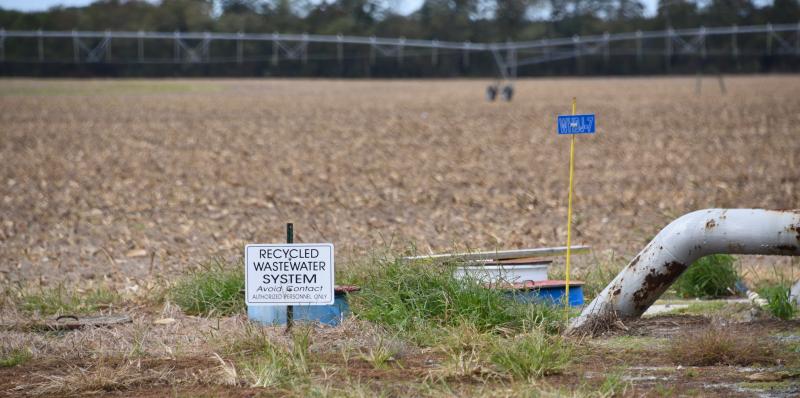State environmental officials have weighed in on an application to add new land for treated wastewater disposal by a Millsboro poultry processing company.
At its Dec. 10 meeting, responses to questions posed by Sussex County Council to Department of Natural Resources and Environmental Control officials were entered into the public record.
The public has until 4:30 p.m., Monday, Dec. 16, to comment in writing on the responses, which are available on the county website or in the county planning and zoning office.
Mountaire Farms of Delaware has filed a conditional-use application to apply sludge and spray wastewater on a 352-acre parcel on both sides of Mount Joy Road and Townsend Road near its Route 24 Millsboro plant. Mountaire currently has 920 acres of farmland in use near Millsboro for spray irrigation.
Although the application includes sludge application, the company announced at the Nov. 5 county council meeting there are no immediate plans to apply sludge on any fields.
Sussex County Planning and Zoning Commission recommended approval of the application at its Oct. 24 meeting; council has deferred a vote.
Some of council's questions follow:
• Is the permit the same for the application of sludge and spraying treated wastewater?
Jennifer Roushey, DNREC environmental program administrator, said spray irrigation and sludge permits have requirements and are regulated under different laws.
• What are the setbacks and regulations for spraying treated wastewater and applying sludge? Is there a limitation on the distance spray is allowed to drift on windy days?
Mountaire's current permit does not allow drift over roadways, Roushey said.
Various setbacks are required for spray irrigation, including a 150-foot buffer from all property boundaries and public roads; 100 feet from domestic wells; 150 feet from public water wells; 50 feet from wetlands; and 100 feet from the edge of lakes or streams.
Sludge application setbacks are broken down by surface application and surface injection application, and vary from 200 feet from off-site dwellings to 50 feet from water bodies.
• In what form is sludge applied to fields?
According to Roushey, although Mountaire has not applied sludge to its fields since 2017, the company has applied several different types of sludge over the years, including liquid sludge injected into the top foot of soil, liquid sludge sprayed on a forested tract of land and solid material applied to the surface and worked into the soil.
• Can fields be used for sludge and spray irrigation, and is there a limitation on when it can be applied?
Roushey said DNREC could permit fields for sludge and spray irrigation; however, both products could not be applied on the land during the same year. She said Mountaire's sludge permit does not allow application Dec. 7 through Feb. 15 unless DNREC approves an application in writing. “Approval to apply sludge during this time period would only be granted if there was an emergency situation at the wastewater treatment plant and the department determined land application of sludge was necessary,” she wrote.






















































